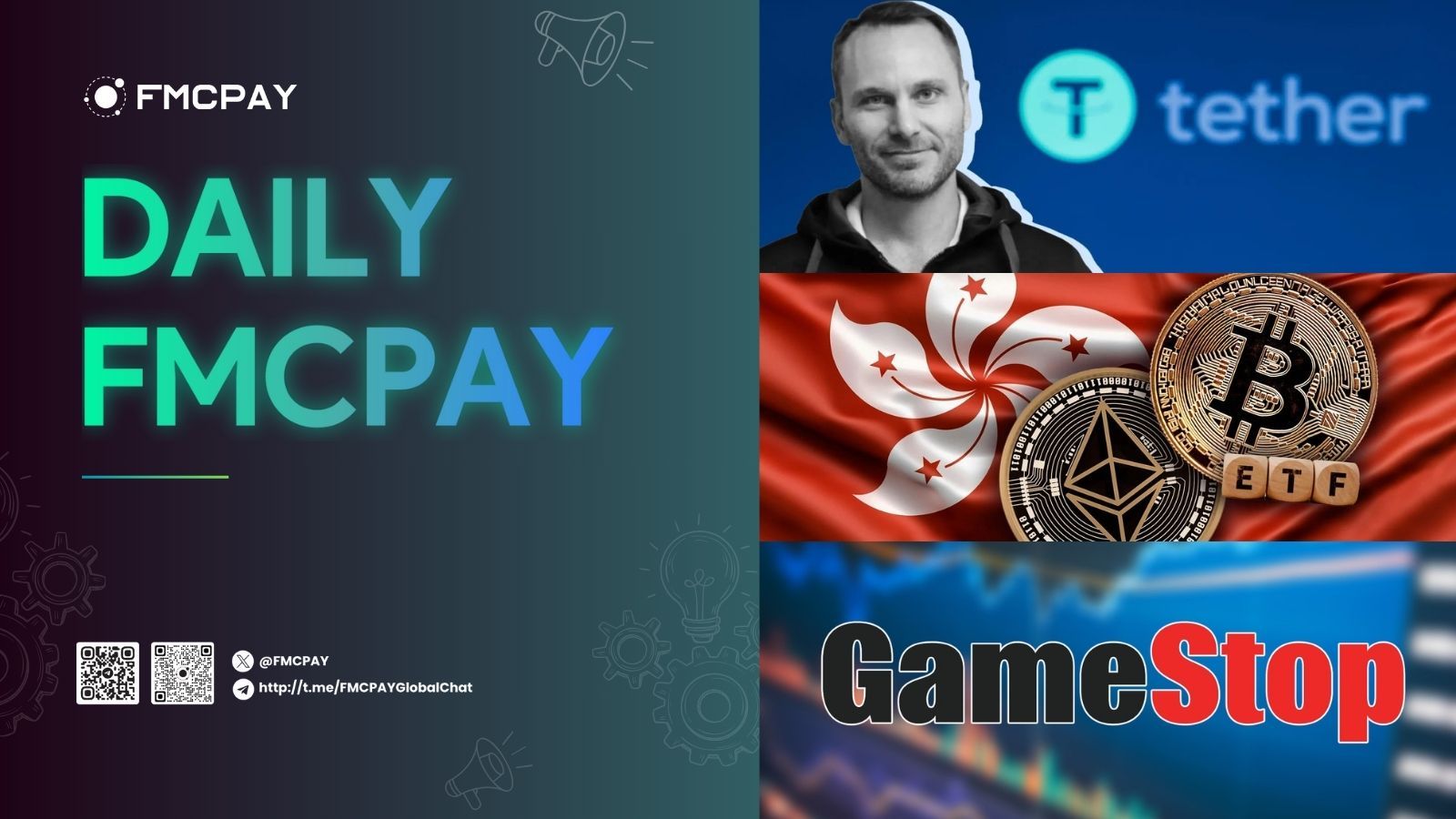Paolo Ardoino, the CEO of Tether, used X to refute claims that both his business and the USDT stablecoin are insecure.

Paolo Ardoino, the CEO of Tether, seems to be trying to refute any ideas that his company’s stablecoin is in any way unstable by posting a lengthy tirade to X on Monday.
An uniformed CEO, leading a company being investigated by the SEC, launching a competitive stablecoin (cui prodest), is being reported spreading fear about USDt.
Let me give you an update on Tether USDt ecosystem safety.
USDt is the most used stablecoin in the world, with…
— Paolo Ardoino 🍐 (@paoloardoino) May 13, 2024
Although Brad Garlinghouse, the CEO of Ripple, seems to be the obvious choice, Ardoino did not identify the CEO in question. In addition to filing a lawsuit against the Securities and Exchange Commission, Ripple recently declared that it will be releasing its own stablecoin, putting it up against Tether’s USDT coin, which holds the highest market share globally.
Garlinghouse, while speaking on a podcast posted to YouTube last Thursday, said: “The U.S. government is going after Tether. That is clear to me.”
“I view Tether as a very important part of the ecosystem,” he also said.
Although Garlinghouse’s remarks seem to indicate that he is not opposed to Tether, they are similar to those of David Schwartz, the CTO of Ripple, who told The Block that “Tether is almost a no-go” for his company “because of the regulatory issues,” adding that “there’s just so much uncertainty around” Tether’s stablecoin. Schwartz was speaking about the launch of his company’s own stablecoin in April.
According to Schwartz, the international payments organization has previously utilized Circle’s USDC stablecoin. Additionally, he stated that Ripple ought to have introduced its own stablecoin earlier.
The remarks made by Garlinghouse and Schwartz may come off as blatant criticism of Tether’s stablecoin, which is presently valued at around $111 billion on the market.
Tether CEO clapping back

It’s not unusual for Ardoino to respond negatively to criticism of USDT. In February, the CEO of Tether referred to JPMorgan as “hypocritical” following the bank’s analysts’ assessment that USDT’s dominating market position is detrimental to cryptocurrencies due to its “lack of regulatory compliance and transparency”.
It seems that Garlinghouse believed Ardoino was actually referring to him in his remark, since the CEO of Ripple replied to the tweet: “I wasn’t attacking Tether,” he said. “My point was that the US government has clearly indicated they want more control over USD-backed stablecoin issuers, and thus, Tether, as the largest player, is in their line of sight.”
Although the US government has recently started examining Tether more closely, the business has been taking action to stop dishonest people from utilizing its USDT stablecoins.
Bitcoin and Ethereum ETFs in Hong Kong view net outflows records since launch
The Bitcoin and Ethereum ETFs in Hong Kong saw large net outflows, which signaled a sharp drop in investor confidence and fund performance.

On Monday, May 13, the Bitcoin (BTC) and Ethereum (ETH) exchange-traded funds (ETFs) in Hong Kong had their biggest-ever net outflow. All advances gained since its inception less than two weeks ago were erased by this incident.
Crypto ETFs in Hong Kong saw significant outflows
The spot Bitcoin ETF funds in Hong Kong, overseen by Bosera, ChinaAMC, and Harvest Global, have seen a $32.7 million net outflow. Based on Farside Investors statistics, ChinaAMC’s Bitcoin fund saw the highest outflow of $15.5 million, resulting in the greatest loss. This large outflow indicates a noticeable change in investor opinion, which has caused the performance of the funds to significantly fall.
There was no one-day restriction on the discharges. Crypto ETFs in Hong Kong have continuously reported net outflows of $52.5 million since May 9. This pattern indicates that people’s trust in these financial products is eroding. The outflows on Monday alone were $20.9 million, exceeding the entire inflows by May 10 of $18.4 million. This pattern implies that investors are retreating from their holdings in reaction to fluctuations in the market.
The same issuers’ spot ether ETFs had a $6.6 million net outflow in total. $3 million was removed from each of Harvest Global’s and ChinaAMC’s Ether funds. The decrease in investments in Ether ETFs is consistent with the pattern seen in Bitcoin ETFs, suggesting a more widespread change in investor sentiment regarding cryptocurrency ETFs in Hong Kong.
Given that the market for Ether ETFs is less than that of Bitcoin ETFs, the losses incurred by these ETFs are noteworthy. With $9.8 million removed from Harvest Global’s Bitcoin ETF, the latest outflows are the fund’s first outflows ever. This is in sharp contrast to the inflows and gains that were seen in the first few trading days after its April 30 introduction.
Post-halving slump affects Hong Kong ETFs
The outflows occur at the same time as Bitcoin falls below $61,000 for the weekend. The post-halving slump, which began on April 20 and saw a 50% reduction in Bitcoin mining incentives, is blamed for this decline. The scarcity mechanism that is ingrained in the Bitcoin blockchain usually causes a price fall as the market gets used to the new schedule of supply.
Investors moved quickly to exit Bitcoin ETFs as a result of the price decrease, expecting more drops. In the past, the halving event has affected the price of Bitcoin, leading to brief declines before possible long-term increases. However, there have been large capital outflows from the ETFs as a result of the poor first reaction.
The cryptocurrency exchange-traded fund (ETF) market in Hong Kong is still much smaller than the US market. Eleven Bitcoin ETFs in the United States handle more than $50 billion in assets between them. On the other hand, the ETFs in Hong Kong oversee $179.2 million in total assets, of which 88.5% is held by Bitcoin ETFs and the remaining portion by Ether ETFs.
After the GameStop rally, memecoin party starts and adds $5B to index
The whole meme coin market had a 34% increase in daily trading activity just after the Wall Street GameStop share rise, bringing $5 billion more in wealth to investors.

The return of GameStop Corp (NYSE: GME) to the market has created a huge fervor on Wall Street. GameStop (GME) saw a robust 75% price rally on Monday, May 13, reaching $30.45. The GME stock price then surged an additional 21% during aftermarket hours. It’s interesting to note that in the past day, the GameStop (GME) meme currency has increased in value by an astounding 2200%. Additionally, this has caused a robust surge in the meme coin market.
GameStop rally triggers 2021 – like memecoin party
Santiment, an on-chain data source, reports that the memecoin market had an eye-catching start to the week with some noteworthy breakouts and decouplings during the last day. In the meme coin market, trading volumes among the top 50 assets increased by more than 34%. Moreover, just one industry has raised investors’ worth by $5 billion in the past day. Dogecoin’s (DOGE) value has increased by 10%.
These days, a lot of people are interested in coins like $PEPE, $MAGA, $MOG, $BITCOIN, $PONKE, $PEPE2.0, $SPX, and $ANALOS, which might see a lot of volatility. These changes demonstrate how volatile the memecoin market is, and they should cause investors to closely monitor these assets.

Short seller losses cross $1B
Reddit traders, under the leadership of Keith Gill, pulled off an incredible comeback against hedge funds during the 2021 pandemic. The hedge funds had been making money on short bets in what they believed to be a faltering physical gaming shop. In less than a month, the price of GME soared by almost 1,000% due to this unanticipated outpouring of support.
S3 Partners data shows that short sellers suffered losses of around $1 billion as a result of Monday’s spectacular spike in GameStop’s stock price.
According to statistics from S3 Partners, hedge funds who engaged in short selling at GameStop suffered a mark-to-market loss of $838 million as the physical video game store saw a 74% increase in sales.
“Roaring Kitty,” who in 2021 inspired a horde of day traders to purchase the gaming stock, is credited with sparking the sudden spike in the stock price, which will go down in Wall Street history. The managing director of predictive analytics at S3, Ihor Dusaniwsky, stated: “This stock is likely to see short covering as it had a 100/100 squeeze score before today’s trading.”
How to earn with FMC & FMCPAY: https://news.fmcpay.com/how-to-earn-with-fmc-fmcpay.html

